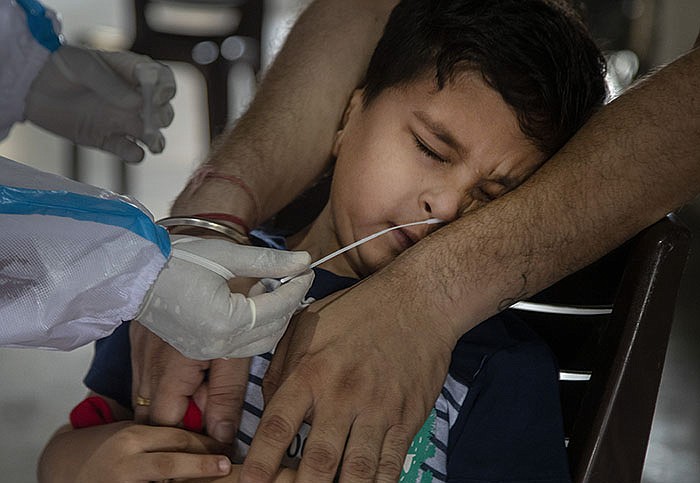Citing increased hospitalization rates of teenagers with covid-19 in March and April, the director of the Centers for Disease Control and Prevention urged parents to vaccinate their teens to protect them from an illness that can be severe even among young people.
Meanwhile, health authorities are trying to determine whether heart inflammation that can occur along with many types of infections also could be a rare side effect in teens and young adults after the second dose of covid-19 vaccine -- but they continue to urge that everyone 12 and older get immunized.
"I am deeply concerned by the numbers of hospitalized adolescents and saddened to see the numbers of adolescents who required treatment in intensive care units or mechanical ventilation," CDC Director Rochelle Walensky said in a statement released Friday alongside a study looking at trends in hospitalization among adolescents with the disease.
"Much of this suffering can be prevented," Walensky added, urging "parents, relatives and close friends to join me and talk with teens" about the importance of prevention strategies and to encourage vaccination.
[CORONAVIRUS: Click here for our complete coverage » arkansasonline.com/coronavirus]
The study showed that nearly one-third of those teenagers hospitalized with covid-19 during a surge of cases early this year required intensive care, and 5% required mechanical ventilation.
While most hospitalizations occur in older adults, severe disease that requires hospitalization has been shown to occur in all age groups. Covid-19 hospitalization rates among adolescents declined in January and February, the report said, but increased during March and April, even as hospitalization rates stabilized for those 65 and older, probably because of their higher rates of vaccination.
Researchers suggest that the increased hospitalization among adolescents may be related to several factors, including more transmissible and potentially more dangerous virus variants; larger numbers of young people returning to school; and changes in physical distancing, mask-wearing and other prevention behaviors.
The Pfizer-BioNTech vaccine, which was authorized for those 16 and older in December, was recommended for use in 12- to 15-year-olds last month.
[Video not showing up above? Click here to watch » https://www.youtube.com/watch?v=nFcIJufog2A]
Even though the study is of a small group of adolescents, CDC officials and other experts expressed concern about the potential for severe disease and stressed the importance not just of vaccination, but of continued mask-wearing and other preventive behaviors until they are fully vaccinated.
"Vaccination is our way out of this pandemic," Walensky said. "I continue to see promising signs in CDC data that we are nearing the end of this pandemic in this country; however, we all have to do our part and get vaccinated to cross the finish line."
The study is based on data from the CDC's covid-19-associated surveillance network, a system of laboratory-confirmed covid-19 hospitalizations in 99 counties across 14 states, covering about 10% of the U.S. population.
The study looked at 376 adolescents 12 to 17 who were hospitalized between Jan. 1 and March 31 and tested positive for the coronavirus. Of that total, 204 were hospitalized primarily for covid-19, the report said, with 31% admitted to an intensive-care unit and 5% requiring invasive mechanical ventilation. None of them died.
About 70% of the 204 adolescents hospitalized primarily for covid-19 had at least one underlying medical condition, the most common being obesity. But nearly 30% had no reported underlying condition, the report said, "indicating that healthy adolescents are also at risk for severe covid-19-associated disease."
Among the 204 teens, 52% were female, 31% were Hispanic and 36% were Black.
Researchers said the cumulative covid-19 hospitalization rates for the adolescents from Oct. 1 through April 24 were 2½ to three times higher than seasonal-influenza-associated hospitalization rates during three recent flu seasons.
"Flu very rarely causes long-term symptoms and organ damage -- unlike covid-19," said Andrew Pavia, a professor of pediatrics and infectious diseases at the University of Utah. "Adolescents have many reasons to get vaccinated as soon as possible, including their own health, the ability to help control covid-19 among more vulnerable groups and the ability to return to normal life."
Researchers said hospitalization rates may be underestimated since some clinicians may not have ordered tests for the virus, and adolescents hospitalized with the rare but serious inflammatory syndrome known as multisystem inflammatory syndrome might not be identified if testing took place more than 14 days after hospital admission.
[Gallery not loading above? Click here for more photos » arkansasonline.com/65covid19/]
BOYS' HEARTS
Separately, an article on seven U.S. teen boys in several states, published online Friday in Pediatrics, is among the latest reports of heart inflammation discovered after covid-19 vaccination, though a link to the vaccine has not been proved.
The boys, 14 to 19, received Pfizer shots in April or May and developed chest pain within a few days. Heart imaging tests showed a type of heart muscle inflammation called myocarditis.
None was critically ill. All were healthy enough to be sent home after two to six days in the hospital and are "doing pretty well," said Dr. Preeti Jaggi, an Emory University infectious-disease specialist who co-wrote the report.
She said more follow-up is needed to determine how the seven fare but that it's likely the heart changes were temporary.
Only one of the seven boys in the Pediatrics report had evidence of a possible previous covid-19 infection, and doctors determined none of them had a rare inflammatory condition linked with the coronavirus.
The cases echo reports from Israel of young men diagnosed after receiving Pfizer shots.
The CDC alerted doctors last month that it was monitoring a small number of reports of heart inflammation in teens and young adults after the mRNA vaccines, the kind made by Pfizer and Moderna.
The CDC hasn't determined if there's really a link to the shots, and they maintain that covid-19 itself is far riskier. The Pfizer vaccine is available to those as young as 12; the Moderna shot has been cleared only for adult use.
This kind of heart inflammation can be caused by a variety of infections, including a bout of covid-19, as well as certain medications -- and there have been rare reports after other types of vaccinations.
Authorities will have to tease out whether cases after covid-19 vaccinations are occurring more often than that expected "background rate."
For now, the CDC says most patients were male, reported symptoms after the second dose, and their symptoms rapidly improved.
"I think we're in the waiting period where we need to see whether this is cause-and-effect or not," said John Grabenstein of the Immunization Action Coalition, a former director of the Defense Department's immunization program.
A Pediatrics editorial noted that among U.S. children younger than 18, there have been more than 4 million covid-19 cases, more than 15,000 hospitalizations and at least 300 deaths.
The Pediatrics editorial said the heart inflammation cases warrant more investigation, but added that "the benefits of vaccination against this deadly and highly transmissible disease clearly far outweigh any potential risks."
DOSES FOR MEXICO
In Mexico, meanwhile, officials said the United States is donating 1 million doses of the Johnson & Johnson vaccine that will be used mainly along the border and at resorts frequented by Americans.
President Andres Manuel Lopez Obrador wrote in his social media accounts that U.S. Vice President Kamala Harris told him the United States would send the vaccine doses but did not specify when.
Mexico's point man on the pandemic said Mexico would set a priority for using the vaccine in Caribbean resorts such as Cancun, Pacific coast resorts like Los Cabos and cities along the U.S. border.
Assistant Health Secretary Hugo Lopez-Gatell did not say whether that was a condition put on the shipment. He depicted it as an economic move, aimed at avoiding partial shutdowns in areas where the economy is based on tourism or cross-border manufacturing facilities.
Asked about where the single-dose Johnson & Johnson vaccine might be applied, Lopez-Gatell said, "We are going to develop operational plans as we get closer to a specific arrival date for this gesture of support."
He cited the Caribbean coast state of Quintana Roo and the Pacific coast state of Baja California Sur as places officials were considering giving priority.
Referring to the northern border, he said, "we have the opportunity, given that this is a gesture of support by the United States, that we can coordinate prevention and control efforts on both sides of the border."
A preliminary analysis of excess deaths suggests covid-19 deaths have surpassed 350,000 in Mexico, one of the highest per-capita rates in the world.
AMERICANS WELCOME
France rolled out a long-anticipated plan for the resumption of international leisure travel to the country Friday, marking a major step toward a degree of normality after a suspension of trans-Atlantic tourism of more than a year.
Fully vaccinated American travelers will be able to return to France starting Wednesday, the French Foreign Ministry confirmed, but they will need to show a negative PCR or antigen test conducted shortly before departure.
It was not immediately clear how U.S. travelers will need to prove that they are fully vaccinated.
Vaccinated Americans are allowed back into the country because of the significant drop in coronavirus cases in the U.S. over recent months and a vaccination rate that exceeds the European Union's. Nonessential travelers from countries with raging outbreaks, including Brazil and India, will remain banned from entering France, even if they are vaccinated.
But the French plans still impose tougher restrictions on American travelers than on tourists from some other countries, including Australia and Israel, where the virus is deemed to be under control.
President Emmanuel Macron had previously suggested that vaccinated Americans would be allowed back in June, and U.S. interest in bookings is on the rise, say French tourism officials.
"We are not talking about numbers as it was in 2019, but the interest is very strong," said Anne-Laure Tuncer, an official with the French Tourism Development Agency who is responsible for the U.S. market. She added that many U.S. tourists appear eager to travel this summer, even on short notice. "People are looking now for June, for July, for August."
Though France has awakened from hibernation at seemingly record speed -- with Parisian cafes and restaurants bustling again, and Macron celebrating the return of the French "art of living" -- many attractions remain largely empty.
On the Champs-Elysees in Paris, there were no tourist buses in sight at lunchtime Thursday. In the avenue's famous luxury stores, display dummies tend to outnumber customers.
Information for this article was contributed by Lena H. Sun of The Washington Post; by Lindsey Tanner, Lauran Neergaard, Mike Stobbe and staff members of The Associated Press; and by Rick Noack of The Washington Post.



